NIGERIAN WOMEN AND 2019 ELECTIONS: A POST MORTEM (PART TWO) BY LADY NKIRU CELINE OKORO
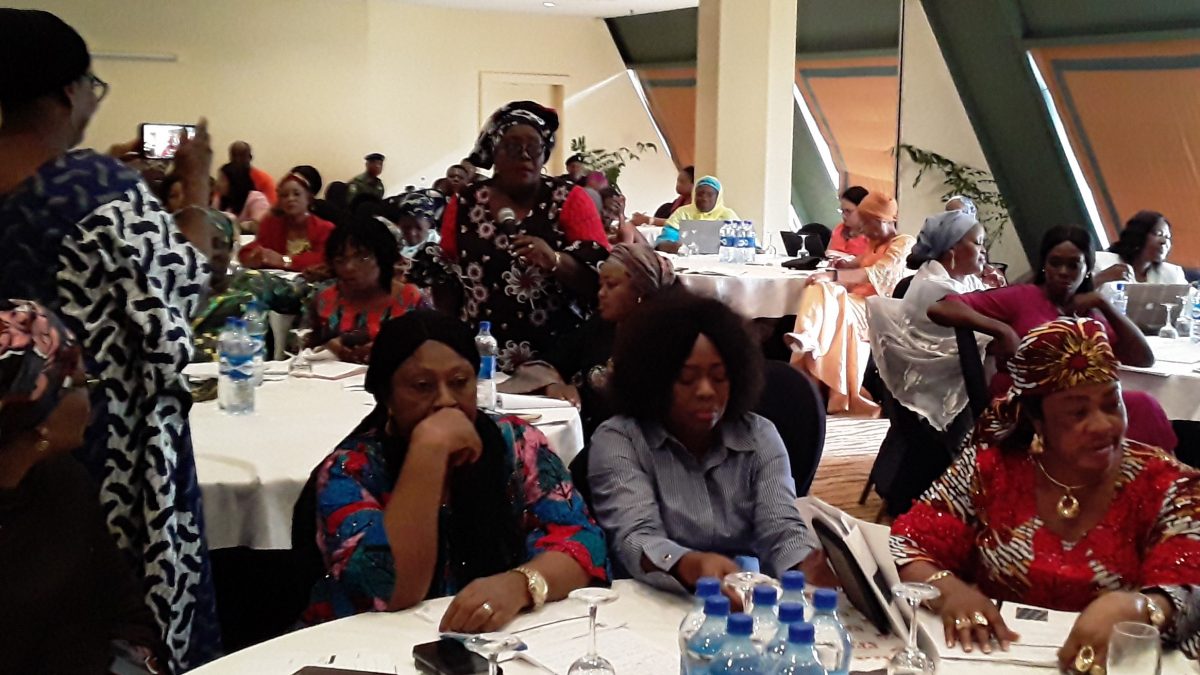
July 12, 2019
CROSS SECTION OF PARTICIPANTS
The recently concluded National conference on women’s 2019 political participation in Nigeria, tagged “A post Mortem, sought to set a post election actionable agenda and roles for strategic stakeholders and influencers in Nigeria’s political space from international Development partners, to security apparatus, political parties, civil society organizations, the media and most important private sector organizations preparatory to 2023.
The private sector in Nigeria have been berated and criticized in various fora for not investing enough in Nigeria’s political systems and processes to influence the outcomes especially for women. In responding to this, Ms. Hansatu Adegbite of Women in Business (WINBIZ) group who facilitated the session titled, “The Role of the Private Sector with Respect to women’s political participation in Nigeria”, blamed the nature and style of politics by Nigerian politicians. She emphasized that while politics is treated in developed countries of Europe and North America as a business investment with billions of dollars investment annually by businesses groups, most Nigerian politicians do not have a strategic plan of what they hope to do and achieve for the business community if and when supported into power. She noted that there is a huge divide between politicians and the business community in Nigeria such that the two groups do not know each other and as a result do not have any form of relationship that could lead to deliberate support for each other in resources, time and energy.
According to Ms Adegbite. Nigerian politicians, both men and women do not apply business strategies to political processes and this is a huge anomaly. In proffering solutions to this problem preparatory to 2023, she opined that politicians must have clear business plans and strategies with unique selling propositions. They must identify with the business community as they identify with women and youths at the grassroots level. This is because, until there are workable linkages and bridges between business owners and politicians, most businesses will not invest in politics and politicians. Nigerian politicians must deliberately answer the question of, “what is in it for the business community?” to attract and sustain their interest in an articulated and documented strategic plan. It is only on this basis that they will attract investments from the business community.
Beyond a well articulated and documented strategic business plan, Nigerian politicians should as a matter of urgency develop the culture of professional lobbying by lobbyist and influencers on a consistent basis whose role would be to influence policies, programs and plans that are not only gender sensitive but would be of immense value and benefit to the business community. These influencers would for instance lobby for pool of funds that could be set aside and leveraged by the business community in the country’s budget. This strategy will help galvanize the interests of the private sector in Nigerian politics and vice versa. It would encourage the business community to pay close attention to political processes, systems and outcomes in the country.
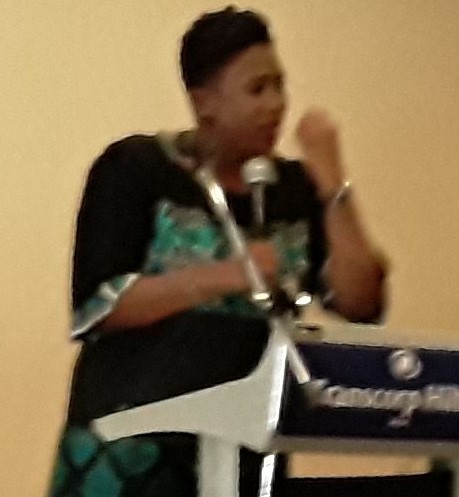
Ms. Hansatu Adegbite of Women in Business (WINBIZ) group
The 2019 women in politics conference unanimously agreed that Nigeria should as a matter of urgency legislate the legal framework including constitution review for the implementation of 35% affirmative action as provided by the extant 2006 Nigerian National gender policy, and its 2007 implementation framework in line with the 1989 International Convention on the Elimination of all forms of discrimination against women (CEDAW) and 1995 Beijing Platform for Action (BPFA) which Nigeria is signatory to without reservation. 35% affirmative action strategy is a global best practice that has worked in South Africa, Rwanda, Senegal, Tanzania and Kenya to mention but a few. Other actions leading to increased women participation in 2023 elections will include strong legislative and executive advocacy to change Laws that hamper increased women participation to the ones that favour more women in politics and governance through holistic electoral reform of political party systems and structures to reflect affirmative action or temporary special measures from the ward level to the national level across all political parties in the country. These will promote gender equity and social Inclusion.
Regrettably, Nigeria is currently ranked 181 out of 193 countries in the global governance index on female representation in governance; better only than war thorn countries of South Sudan, Afghanistan, Pakistan, Syria and Democratic Republic of Congo.
The Conference which was sought to identify what worked, what failed and what must be done differently preparatory to 2023 advised female politicians to:
- BECOME SOLUTION AND ACTION CENTERED; by being actively involved in the political party systems, structures and processes from the ward level to the national level as active participants able to negotiate principal party positions as opposed to the fringe traditional role of women leaders in their various political parties.
- GOD FATHERISM/MOTHERISM: Nigerian women in politics, arising from the conference are encouraged to adopt God fathers and God mothers especially among party stalwarts and Governors and their wives in major political parties as a way of guaranteeing their tickets in party primaries to emerge candidates that could win major elections at state and federal levels. This is identified as a necessary antidote to having tones of money in dollars, Pounds, Euros and Naira, said Iyom Josephine Anenih, former Minister for Women Affairs & Social Development. Corroborating this position, the current Deputy Governor of Kaduna State, Dr. Hadiza Balarabe affirmed to the conference participants that the only reason she emerged the first female elected Deputy Governor of Kaduna State in the 2019 general elections is because her principal, Mallam Nasir El Rufai, Governor of Kaduna state chose and adopted her as his deputy.
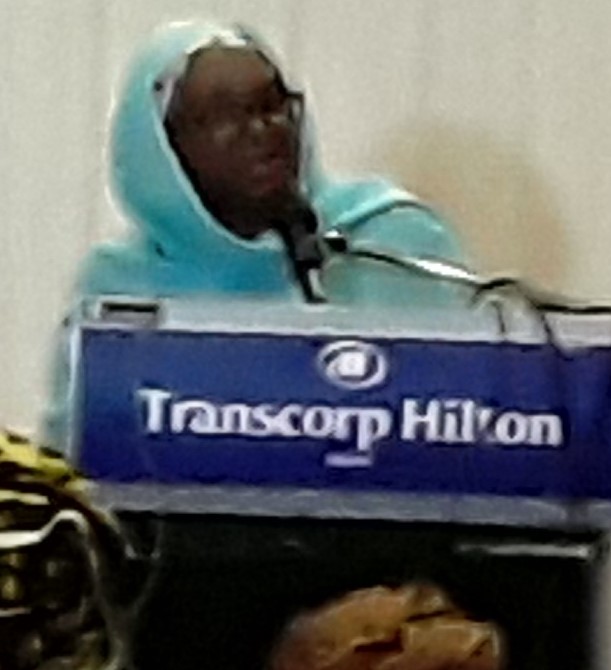
Dr. Hajia Hadiza Balarabe: Deputy Governor, Kaduna State.
Similarly, Deputy Speaker, Akwa Ibom State House of Assembly, reaffirmed this position and advised Women to have God Mothers or God Motherism in the person of the Governors Wife in their state or wives of party stalwarts as the case may be.
PSYCHOSOCIAL SUPPORT: Providing psycho social support for one another as female politicians is one area most Nigerian politicians have been found wanting and this ought not to be. Expectedly, participants at the conference advised women to work together across political party systems and structures because men do the same. They need not fight each other; rather they should be seen to close ranks supporting each other in the quest to achieve parity in gender power relations. Women must work across parties and synergize. They must also share Information among themselves.
CAPACITY BUILDING: A lot of female politicians do not have capacity to deliver their electoral promises and this poses huge challenge to their aspirations. Enhanced capacity will enable female politicians to be more analytical, critical and understand politics as a battle and struggle for power as opposed to politics as a Tea Party. Enhanced capacity of female politicians will lead to clarity of objectives, goal setting, vision and mission statements as well core values. Attending meetings at constituency level or among party leadership and structures should not be seen as optional but compulsory and at all costs. Enhanced capacity will translate to improved people relationship and friendliness at grassroots level as politics cannot be played by proxy.
THE MEDIA: Also recognized and known as the fourth estate of the realm and a critical stakeholder in moulding societal norms and values as well as opinions and perceptions, the 2019 women’s political conference berated Nigerian female politicians for not leveraging the media in their political process leading to the elections. The media from the print to electronic including radio, television and the social media are important tool for projecting positive self image.
Female politicians were encouraged to develop effective communication strategy as well as capacity for media engagement by making sure they have a media component in planning and executing their campaign programs.
The high costs of media coverage and demand for money by some media outfits to cover political campaigns were identified as a minus that did not work effectively for some female politicians in the 2019 general elections.
The Nigerian media were further berated by the participants as not doing enough for women in politics in the 2019 elections. With funding from UN women, Women Radio in the 2019 general elections profiled 46 female candidates, in 36 episodes across six selected states. The states not covered advised that leading to 2023 elections, the media should seek more funding to provide comprehensive media coverage for all female aspirants and candidates throughout the 36 states of the federation.
Relieving their media experiences before, during and after the 2019 elections, Ms. Yemisi Ayokunle from Ekiti state complained of huge media backlash in her campaign. In kwara State, Mrs. Folasade Arusola, complained that most women did not leverage media access for their 2019 political campaign due to ignorance of the role of the media. For most women in Northern Nigeria, the media was totally absent in their campaign. They requested that the media should come to their aid as there is no basis for comparison between the Northern female politician and her southern counterparts. The North certainly cannot compare or measure up with the south as the south are more exposed.
The few exception to the low use of the Nigerian media space included Mrs. Omobolanle Sarumi Aliyu, National Interest Party’s (NIP) Oyo state gubernatorial candidate. Said she, “l leveraged every opportunity l had including use of crowd funding on the internet to raise over 5million Naria for my campaign”.
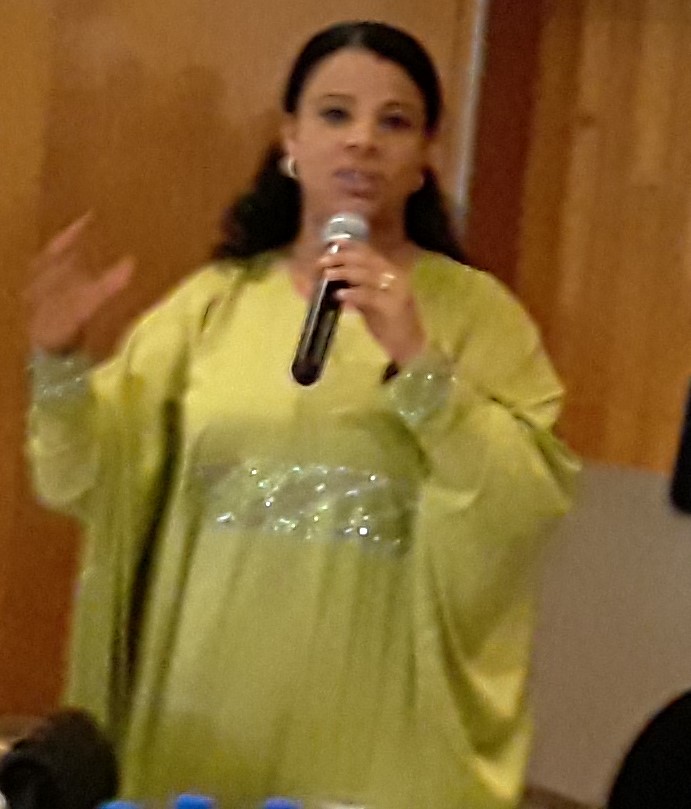
Mrs. Bolanle Sarumi Aliyu: Oyo state Gubernatorial Candidate in 2019 elections National Interest Party (NIP).
Besides, Ms. Bolanle Sarumi, Honourable Favor from Rivers state House of Assembly affirmed that the social media worked very well for her in her campaign for her seat.
Women in the media were advised to engage Nigerian Broadcasting Corporation (NBC), its regulatory body with a view to reviewing its code of conduct to be more gender sensitive and inclusive of the needs of Nigerian women especially those in politics.
INCIDENCIES OF VIOLENCE AGAINST WOMEN DURING THE 2019 ELECTIONS:
In her synopsis of documented electoral violence women suffered in the 2019 general elections, by DR JOY ONYESO, International President, WOMEN’S INTERNATIONAL LEAGUE FOR PEACE AND FREEDOM (WILPF), explained that one in every four female political aspirant in the 2019 elections suffered one form of abuse or the other including verbal abuses, intimidation, character assassination and hate speeches of various degrees. Unfortunately, neither police, nor other law enforcement agencies could do anything to redress this negative trend against female politicians.
In Bornu state, the situation was very grim in Boko Haram controlled local government areas such that indigenes fled to neighboring Cameroun yet INEC declared 34000 votes in communities where elections did not hold at all due to violence.
Despite the anomalies, 2019 general elections recorded some significant milestones including producing the highest number of female political aspirants totaling over 3000 in 20 years of Nigeria’s democratic governance. Besides, of the 91 political parties that participated in the elections, 21 had female chairpersons who in most cases founded their political parties. 79 women contested deputy governorship seats in 36 states of the federation, 59 women contested various senatorial seats while 69 women contested house of representative seats. 40 women contested various seats in the states houses of assembly. 40 political parties fielded female candidates to various positions said Mr. Peter Ameh of Inter Party Advisory Council (IPAC). On the whole, women comprised less than 12% of total aspirants, less than 5% emerged successful across national and state levels elections.
The 2019 women in politics conference also recommended that Election Management bodies should as a matter of urgency embark on voter education early enough to avoid the high number of void votes witnessed in the 2019 elections that were enough to impact the outcome of the elections. They should also review its electoral processes and systems to decipher what worked and what did not work in the 2019 elections and set up political parties ombudsman to hold parties accountable to their manifestos so that political parties that do not comply to their party manifestos are punished appropriately. They also recommended further review of the 2018 electoral act as amended.
The conference keynote address titled; “20 Years Of Democracy And Women’s Participation In Nigeria” by Professor Olabisi Aina Obafemi Awolowo University Ile Ife Osun State was delivered on her behalf by Mrs. Felicia Onibon, Executive Director, Change Managers Initiative, and co convener 100 women lobby group.
The paper identified the following as major impediments to women’s effective participation in politics in Nigeria. They include but not limited to:
1. LACK OF POLITICAL WILL,
2. LACK OF LEGAL FRAMEWORK: HOW FAR CAN WE GO TO ACHIEVE THIS WITHOUT THE REQUISTE NUMBERS IN THE CURRENT NATIONAL ASSEMBLY?
3. WEAK TECHNICAL SUPPORT FOR WOMEN & GIRLS’
4. LACK OF PROFESSIONALISATION OF THE POLITICAL SPACE
5. DECREASING POLITICAL SPACE FOR WOMEN
6. PATRIACHY: THIS SHOULD BE DISMANTLED OR MODIFIED TO RESPOND TO THE NEEDS OF WOMEN AND GIRLS IN THE SOCIETY.
7. SECURITY & VIOLENCE AGAINST WOMEN INCLUDING HATE SPEECH;
8. FINANCIAL CONSTRAINTS AND EMERGING ISSUES AMONG OTHERS:
The sub themes discussed at the conference were:
1: ROLE OF POLITICAL PARTIES WITH RESPECT TO WOMEN’S POLITICAL PARTICIPATION IN NIGERIA INCLUDING PREELECTION ISSIES (NOMINATION FOR PRIMARY ELECTION, PARTY PRIMARIES ETC;
ELECTION DAY AND POST ELECTION INCLUDING WHAT WORKED FOR WOMEN, WHAT DIDN’T WORK AND WHAT CAN BE DONE DIFFERENTLY? DISCUSSANTS WERE MS IDAYAT HASSAN OF CENTER FOR DEMOCRADY AND DEVELOPMENT (CDD) AND PETER AMEH INTER-PARTY ADIVORY COUNCIL (IPAC).
2: CIVIL SOCIETY ENGAGEMENT WITH RESPECT TO WOMEN’S POLITICAL PARTICIPATION IN NIGERIA. INTERVENTIONS TO PROMOTE WOMEN IN POLITICS: WHAT SHOULD BE DONE AHEAD OF THE 2023 GENERAL ELECTIONS BY MR CLEMENT NWANKWO OF LEGISLATIVE POLICY AND ADVOCACY CENTER (PLAC).
3: ELECTION MANAGEMENT BODIES / THE ELECTORAL LEGAL FRAMEWORK WITH RESPECT TO WOMEN’S POLITICAL PARTICIPATION IN NIGERIA: LEGAL IMPEDIMENTS TO WOMEN REPRESENTATION, VOTER EDUCATION AND STAKEHOLDER ENGAGEMENTS ANCHORED BY PROFESSOR JOY EZEILO (DEAN, FACULTY OF LAW, UNIVERSITY OF NIGERIA, ENUGU CAMPUS) AND DR ABIOLA AKIYODE AFOLABI CHAIRPERSON TRANSITION MONITORING GROUP AND EXECUTIVE DIRECTOR WARDC
4: THE ROLE OF THE MEDIA INCLUDING GENDER SENSITIVE COVERAGE, MASCULITY OF POLITICS IN MEDIA BY TOUN OKEWALE SONAIYA, CEO WOMEN RADIO AND MRS TOSIN DOKPESI MANAGING DIRECTOR, AFRICA INDEPENDENT TELEVISION (AIT).
5. THE ROLE OF THE PRIVATE SECTOR WITH RESPECT TO WOMENS POLITICAL PARTICIPATION: WHAT IS THE MISSING LINK THAT NEEDS TO BE BRIDGED AND HOW CAN WOMEN LEVERAGE THE PRIVATE SECTOR FINANCING BY HANSATU ADEGBITE OF WIMBIZ – WOMEN IN BUSINESS AND MANAGEMENT.
6. ELECTION SECURITY AND VIOLENCE AGAINST WOMEN IN ELECTIONS AND POLITICS: IMPACT OF VIOLENCE AGAINST WOMEN IN POLITICS AND PROTECTION AND THE ROLE OF SECURITY FORCES BY DR ELEANOR NWADINOBI.
7. INTERNATIONAL COMMUNITY’S ENGAGMENT AND INTERVENTIONS TO PROMOTE WOMEN IN POLITICS: CO-ORDINATION, LONG AND SHORT TERM INTERVENTION AND NATIONAL OWNERSHIP AND WHAT COULD BE DONE DIFFERENTKY AHEAD OF 2023 ELECTIONS BY MS MARIA – TERESA MAURO, PROJECT COORDINATOR ECES AND MS SOULEF GUESSOUM, UN WOMEN REGIONAL ADVISOR (WPE)
The two day conference was a collaborative initiative of the following international and local partners and stakeholders including UN Women, Canada International Development Agency, United Nations Development Program (UNDP), Ford Foundation, European Union (EU), European Center for Electoral Support (ECES), USAID, UKAID, IFES, WILPF, Nigerian Women Trust Fund, Women in Politics Forum, and Inter Party Advisory Council IPAC.
PICTURE SPEAKS
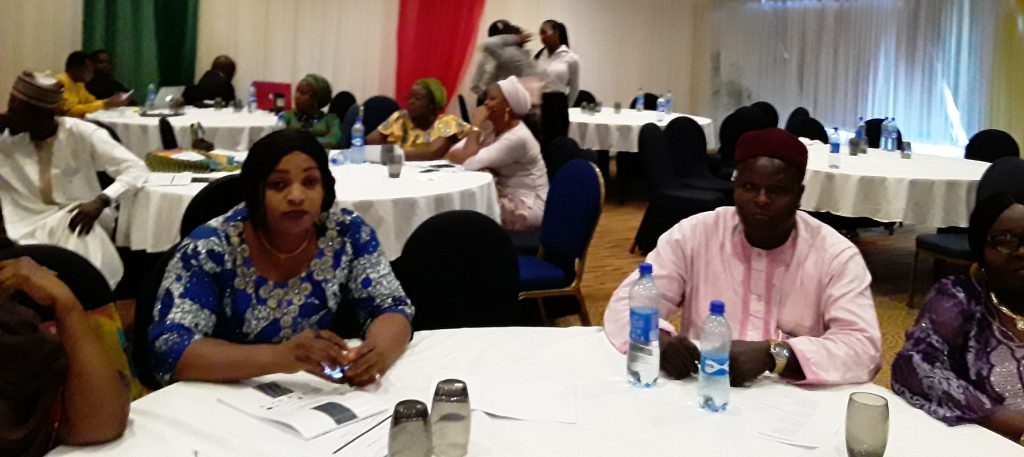
CROSS SECTION OF PARTICIPANTS
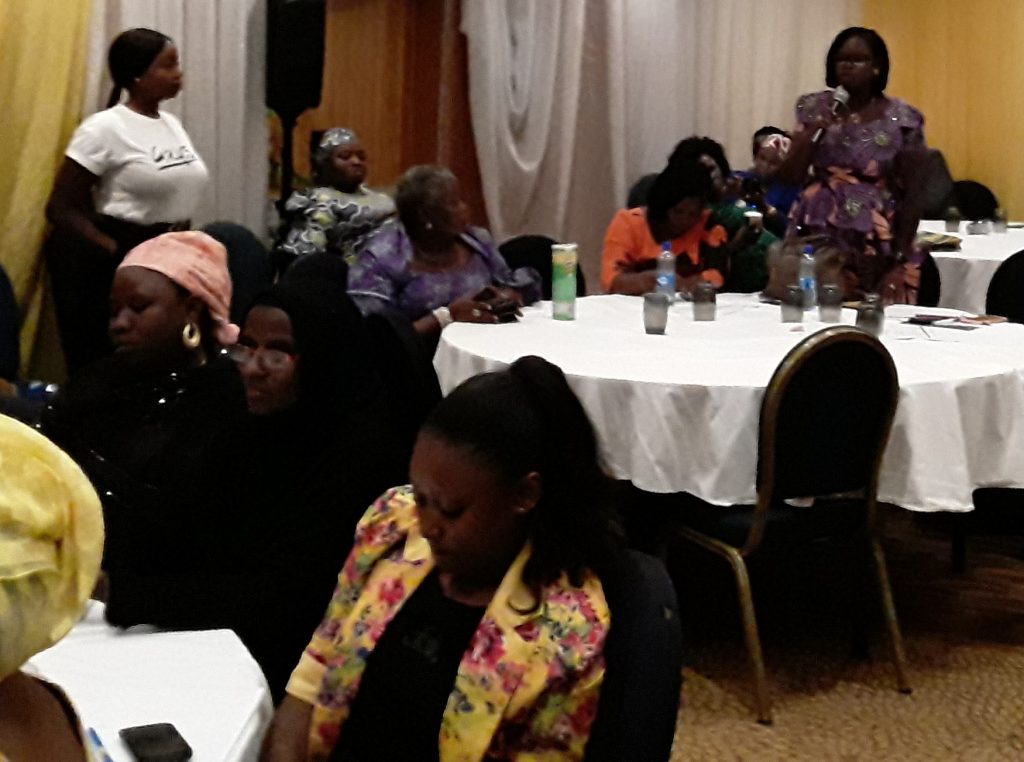
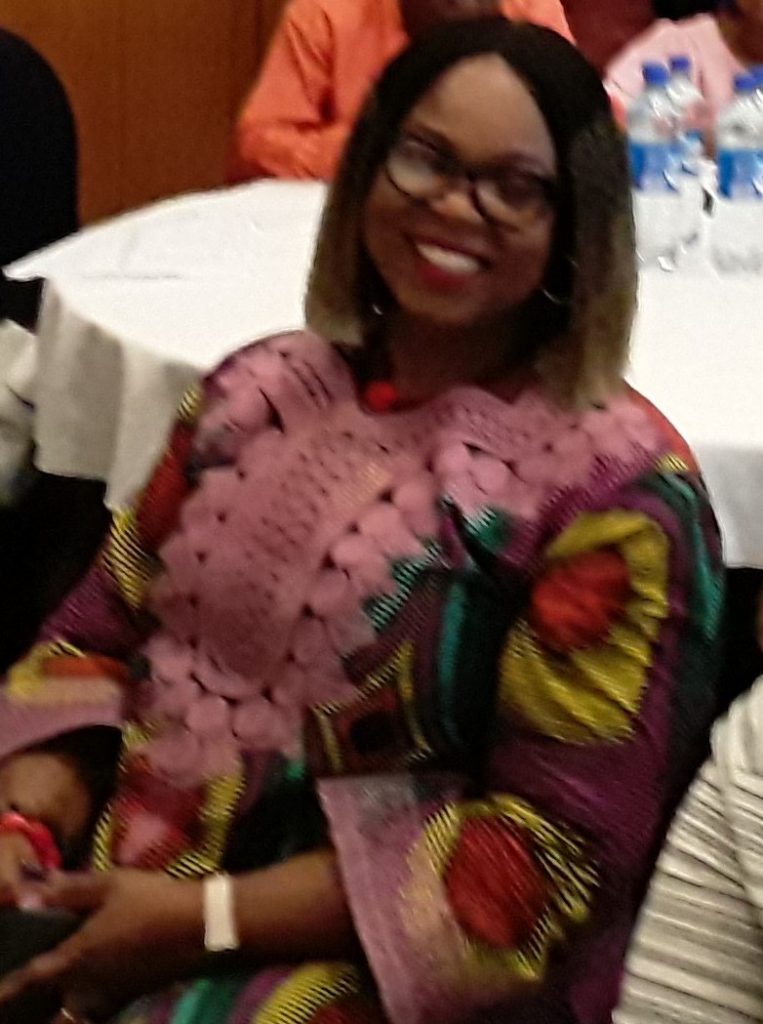
PROFFESSOR JOY EZEILO, DEAN, FACULTY OF LAW UNN.
6 thoughts on “NIGERIAN WOMEN AND 2019 ELECTIONS: A POST MORTEM (PART TWO) BY LADY NKIRU CELINE OKORO”
Comments are closed.

This is a welcome development,i congratulate His Excellency Engr Seyi Makinde for choosing a woman as SSG.
A shinning light for others to follow. Thumps UP OYO State
Women need to rise up against this male chauvinism in all places of leadership in Nigeria.
They just team up, intimidate the women and ensure they continue to take and hold on to leadership position.
Women need to arise today. Once any leadership position gets to us , let s not make the mistake of handing over to a male. Ensure you mentor a female that will take over from you no matter what it will take.
I recognize the fact that females are not easy toe mentor, but we must keep on with the women mentor women project for us to get to our distinction of leadership.
Thanks l agree with you. Lets all stay together committing to the change we all deserve. Great thanks for your constructive comments on our post.
Congratulations to the organisers of this important and timely Forum. Please let us keep up the tempo by following up on the recomendations individually and collectively across all States. 2023 is just round the corner.
Thanks Aunty,
That’s the spirit